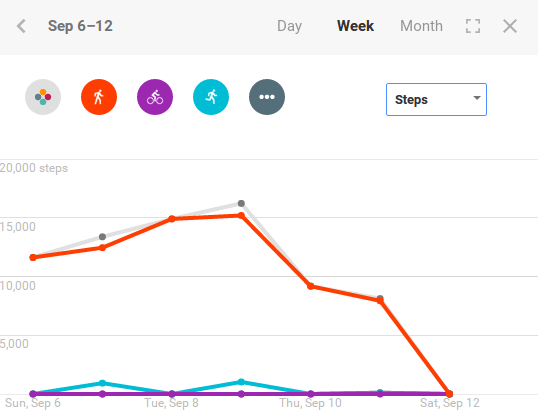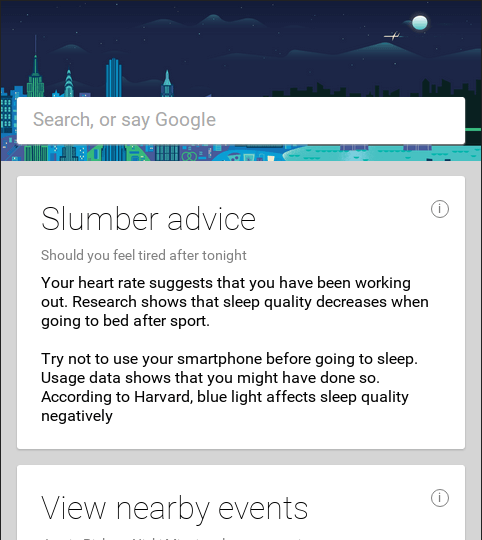Having looked at wearables intensively for several weeks, I want to share my vision of how they should be developed further. Being mere data displays until now, wearable technology has the potential to be so much more. Making data actionable is what I am talking about.
Wearables I have looked at include: Withings Ox, Fitbits Charge HR, Motorolas Moto 360 and the Misfit Shine. All of these feature step and sleeptracking capabilities and have accompanying feature-rich applications doing a good job at visualizing the collected data.
Just take a look at the gorgeous graph web-based Google Fit draws for my step data (as of September 2015):

The data displayed is very clear. It displays how many steps I have made each day within a week. We can view a similar graph for the day before, the day before that, the week before that, some months back and so on. We can also view monthly statistics.
Would we be able to derive actionable insights from the data? What use is six months worth of data if you have no clue about how to read it? Does it deliver any value besides “Oh that is a lot” or “oh that is not so much”? Machines are very good at deriving patterns from great amounts of data - and I believe that this capability should be put to use.
Providing background information
Let’s have a look at this graph of sleep information. It tells me when I experienced deep sleep and light sleep and when my body moved during sleeping. Now I can see when I entered a different sleep phase. But what will I do with this information? Can I improve my sleep based on this data? I could, if I knew how.
Giving actionable advice
I could make changes if I knew about basic sleep mechanisms and how behaviour before going to bed affects sleep. Certainly no secret, the blue light emitted by electronic devices affects our sleep in a bad way. Wouldn’t it be great if such an insight was shared with users of the app?
I believe that the user should not have to have to analyze the data himself (although he should certainly have the possibility to do so), but that analytics should give actionable advice, if it can be given. This way, a source for information overload is reduced and the matter is only brought to our attention if it is demanding. One possibility might be via simple Google Now Card:

There is already an app that does something in that direction. Sleep as Android gives recommendations on how to catch up on sleep deficit, although these tips are standardized and not tailored to ones demands.
If anyone of Misfit, Fitbit, Withings, Google or Motorola reads this: These devices are great! Team up with some fitness experts and give your product an edge over the competition! What makes a tracker really valuable is the data analytics, not the hardware. Take a look at Freeletics for example. They provide members with weekly tips and insights in bodily functions and regeneration mechanics. This information could easily be reused in your applications!